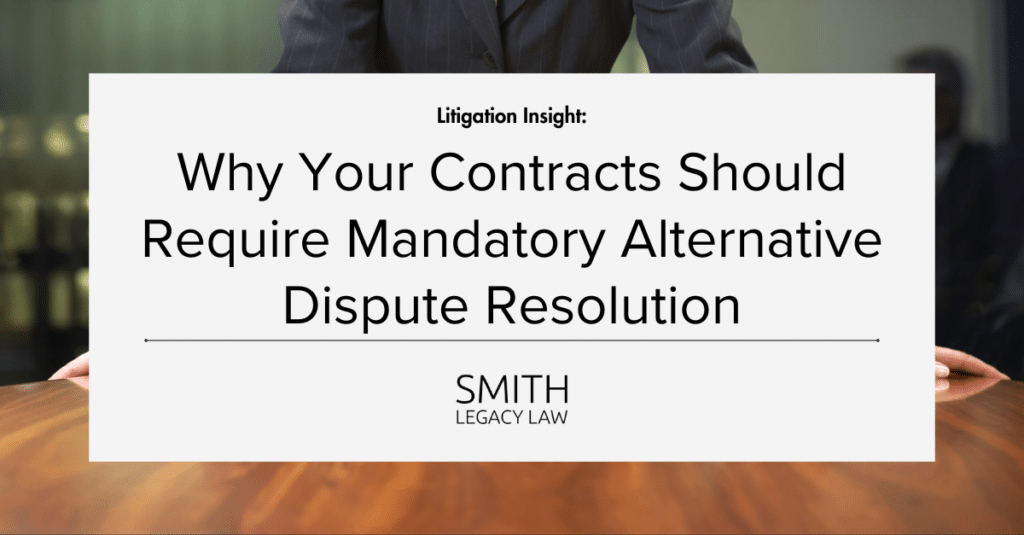Home / Litigation /
Mediation and Arbitration

Not every dispute needs to end up in court.
In fact, more and more businesses and individuals are turning to various forms of alternative dispute resolution to avoid costly and time-consuming lawsuits. To facilitate this trend, all 50 states have enacted statutes and administrative code provisions that create alternatives to traditional litigation.
Smith Legacy Law has considerable experience representing high-net-worth individuals and businesses seeking to resolve conflicts without the intervention of a court. No matter the nature of your dispute, our attorneys will act as your trusted counselors and advisors, providing skillful guidance to confidently navigate each step of the mediation or arbitration process to ensure that the interests of you and/or your business are well-represented and protected.
Why Consider Alternative Dispute Resolution?
Alternative Dispute Resolution or ADR is an umbrella term for various ways individuals and businesses can resolve disputes without going to court. Beyond cost savings and speedier settlements, ADR offers adversaries several distinct advantages compared to traditional litigation:
- While courtroom proceedings are public, ADR allows parties to maintain confidentiality.
- ADR proceedings are generally less formal – and therefore less stressful – than courtroom proceedings.
- The rules governing ADR proceedings are far simpler than those governing the courtroom. Strict evidentiary rules don’t apply, and certain issues can be handled through phone calls rather than lengthy, multiple hearings.
- The parties play a central role in resolving disputes, often resulting in creative solutions, longer-lasting outcomes, mutual satisfaction, and improved relationships.
- Arbitrators, mediators, and other facilitators will have subject matter expertise, unlike judges, who are assigned randomly. The parties to ADR may even choose their facilitator, provided they can come to an agreement.
- Appeal rights are very limited in arbitration, so decisions tend to have finality.
Scope of Our Arbitration and Mediation Services
Our attorneys possess the experience, knowledge, and resources required to assist in the resolution of significant and sensitive disputes. Whether you need legal counsel to guide you through an ADR proceeding or an attorney to act as a facilitator or moderator, Smith Legacy Law can assist with all manner of arbitration and mediation proceedings:
Arbitration
Arbitration provides parties to a dispute with the opportunity to present their side of the issue to an impartial third party who usually has subject matter expertise in the matter at hand. Depending on the specifics of a contract’s arbitration provision and the laws of a particular state, an arbitration proceeding may take one of several forms:
- Binding arbitration: The arbitrator’s decision is final and not subject to judicial appeal.
- Non-binding arbitration: The decision is not final but may serve as the basis for further negotiations.
- High-Low Arbitration: The arbitration award is guaranteed to fall within a specific dollar figure. Should the arbitrator’s award fall outside of the agreed-upon range, the difference will be disregarded.
Arbitration is often conducted under the rules of the American Arbitration Association, the International Center for Dispute Resolution, JAMS, the International Chamber of Commerce, or the International Institute for Conflict Prevention and Resolution. However, proceedings may also be governed by rules of specialized associations or in accordance with state statutes or an agreement struck by the parties.
Mediation
Mediation allows willing parties to work cooperatively toward a settlement or fair resolution of their dispute with the help of a neutral mediator who facilitates the process. Depending on state laws, contract provisions, and the wishes of the parties, mediation proceedings may utilize one of several approaches:
- Facilitative: The mediator attempts to facilitate an agreement between the parties. The mediator generally won’t volunteer their view of the conflict or offer recommendations regarding a settlement.
- Evaluative: The mediator helps parties assess the legal merits of their arguments and make fairness determinations. An evaluative mediator is permitted to express opinions and can even offer suggestions or recommendations.
- Transformative: Transformative mediators focus on empowering the parties to resolve their conflict and encouraging them to recognize each other’s needs and interests.
Mediation is the most popular form of ADR and can be utilized to resolve just about any non-criminal case, including disputes that involve contracts, leases, small businesses, employment, child custody, and divorce.
Other Forms of ADR
Though not as common as mediation and arbitration, there are several other forms of ADR, including two hybrid approaches that utilize characteristics of mediation and arbitration:
- MED-ARB approach: The parties agree that if mediation ends in an impasse or issues remain unresolved, they’ll proceed to arbitration. The mediator may act as the arbitrator, or the dispute can be transferred to another neutral third party who’ll receive a briefing from the original mediator.
- ARB-MED approach: A neutral third party hears evidence and writes an award. However, the award remains sealed as the parties attempt to mediate and will only be unsealed and become binding if they cannot reach an agreement.
- Mini-Trials and Simulated Jury Trials: The parties or their attorneys make their cases before a neutral judge or a simulated jury. The ‘verdict’ serves as the basis for further negotiation.
- Conciliation: A conciliator meets separately with each side and attempts to resolve differences. The parties are not required to meet face-to-face.
Learn More About Our Mediation and Arbitration Services
A dispute doesn’t have to result in a lengthy and costly court battle.
To learn about the mediation, arbitration, and other ADR proceedings that may be available to you and arrange for your free consultation, please contact Smith Legacy Law today.
Contact an Experienced Mediation and Arbitration Lawyer Today
Mediation and arbitration can provide a more efficient means of dispute resolution, but rules governing these proceedings are complex and vary from state to state.
Smith Legacy Law provides clients with the guidance and advice to navigate such proceedings with confidence and ensure their interests are well-represented.
